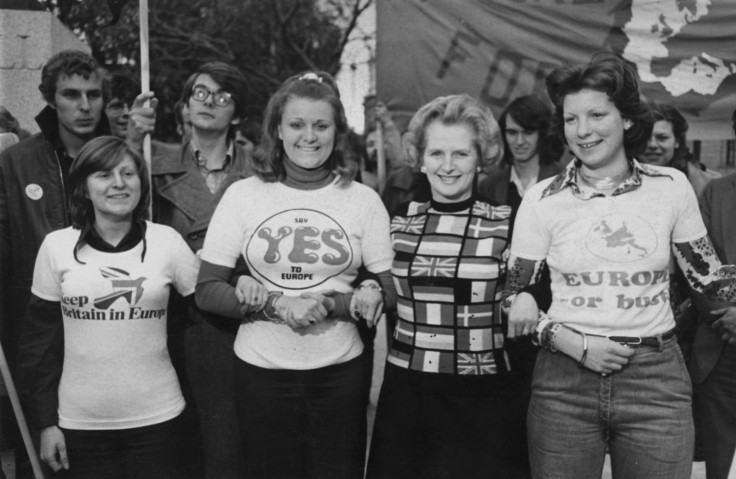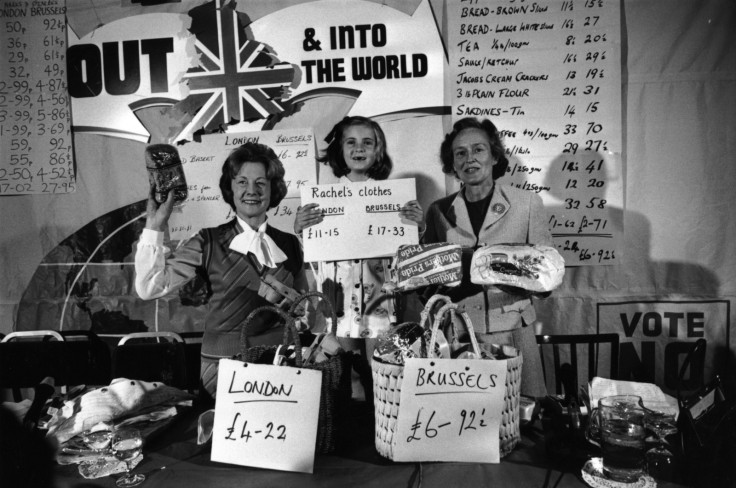The EU referendum campaign is as one-sided as it was in 1975

In the wild world of British politics the past is a treacherous guide as to what might happen in the future. Nothing is ever the same. Sometimes, though, there are exceptions to this rule. The parallels between the current EU referendum and the one held in 1975 are precise.
There are the strikingly stark similarities. David Cameron only offered this referendum in an attempt to keep his party together. He has not discovered a sudden passion for direct democracy. In 1975 the then Labour Prime Minister, Harold Wilson, held a referendum in order to maintain the unity of his party. The offer of a referendum did indeed bind Wilson's party. But once he had to hold the plebiscite ministers fell out in public and the spell of collective cabinet responsibility was never recast effectively for the rest of that government's tottering life.
Now senior Conservatives fall out with the same intensity and the public displays of convivial unity that preceded Cameron's naming of the referendum date will never be on show in quite the same way again. Labour was traumatised by what happened in 1975. The Conservatives are traumatised now and will be after the result. John Major's ferocious attack on Boris Johnson, carefully co-ordinated with Number 10 and the Remain campaign, highlights the degree to which considerations of future party unity have been discarded in the heat of battle.
The same happened to the Labour government in 1975 when the then Home Secretary Roy Jenkins targeted the Industry Secretary, Tony Benn. Jenkins declared he could not take Benn seriously as an economics' minister, as damning as Major's rehearsed dismissal of Johnson as a "court jester".
Ukip's Nigel Farage raised the temperature of this campaign further by warning of more Cologne- style attacks on women if the UK stays in. This tasteless intervention was widely condemned but a campaign is not a public education seminar. It is a political battle where anything goes. In 1975 equally bizarre claims were made and then hyped up.
The parallels extend beyond the rediscovery that referendums are the equivalent of 'femmes fatales' in film noirs, enticing Prime Ministers and then clobbering them in the final act. Against expectation the current campaign is as one-sided as it was in 1975 and for the same reason, the broad range of those advocating 'In' and the coherence of the message.
John Major's ferocious attack on Boris Johnson, carefully co-ordinated with Number Ten and the Remain campaign, highlights the degree to which considerations of future party unity have been discarded in the heat of battle.
Forty years ago virtually every weighty economist argued for 'In' along with the support of the Prime Minister, former Prime Ministers, Chancellor, former Chancellors and the Leader of the Opposition, Margaret Thatcher. The 'out' campaign was led by a few charismatic figures on the left and right, including Michael Foot and Tony Benn. Enoch Powell campaigned separately from the right. On his recent BBC programme Jeremy Paxman suggested that in 1975 the 'Out' campaign was not about sovereignty as it is now. Paxman is wrong. The arguments of Benn in particular were solely about sovereignty and were exactly the same as those being advanced now by Michael Gove.
Then the 'out' campaign had no decisive arguments over why leaving would be of benefit to the fragile UK economy. The same applies now. The current 'out' campaign, or campaigns, have made a significant miscalculation in arguing that the UK would leave the single market if it votes for withdrawal from the EU. They did not have to make this case. In doing so they leave themselves even more exposed to the claim from Remain that they are advocating a leap into a dangerous unknown.
Some leading 'outers' would have preferred to argue that the UK could remain in the single market and outside the EU. But the out campaign is fractured and offers no coherent vision of what the UK would look like outside the EU, which is why Norway, Switzerland and Canada have been cited and discarded as potential models.

In 1975 the out campaign was similarly fractured. Benn and Powell focused virtually solely on arguments about democracy. His cabinet colleague, Barbara Castle, focused more on prices, arguing without evidence they would come down if the UK left the EU or Common Market as it was then. In contrast the 1975 'in' campaign was disciplined. Figures from different parties were content to appear on the same platforms. The message was strictly adhered to, focusing above all on the benefits of membership to the UK economy.
If the polls prove to be accurate and the result is close we will learn much about the UK and the voters' determined refusal to listen to reasoned argument, as resolute as those in the US hailing Donald Trump's shallow pledges.
The current 'remain' campaign is similarly disciplined, liaising so closely with Number 10 and the Treasury that some of Cameron's senior advisers have moved into the office of the campaign. The message has been consistent and coherent: don't take the economic risk of leaving. Even those who have paid no attention to the campaign, probably the vast majority of voters, could not have avoided the message altogether.
Then the 'out' campaign had no decisive arguments over why leaving would be of benefit to the fragile UK economy. The same applies now.
In 1975 the outcome of the referendum was as one-sided as the campaign, a big win for the 'In' campaign. Will this be another parallel with the current referendum? Polls suggest the outcome will be much closer. It is possible that the result of the current referendum might be where the parallels with 1975 sensationally do not apply.
If the polls prove to be accurate and the result is close we will learn much about the UK and the voters' determined refusal to listen to reasoned argument, as resolute as those in the US hailing Donald Trump's shallow pledges. If the result is a significant win for Remain we will know that whatever the intensity of the anti-politics mood voters are willing to listen to big authoritative figures, reflect and vote accordingly.
Either way referendums never end debates. They intensify them. Expect calls for a second referendum within days or perhaps hours of the result. Five years after the 1975 referendum Labour was campaigning to leave the EU. In the short term I hope voters are in the mood to listen, reflect and vote to remain in the EU. If they do they will get another chance before very long to listen and reflect once again. Look at Scotland. Referendums resolve nothing.
© Copyright IBTimes 2025. All rights reserved.






















